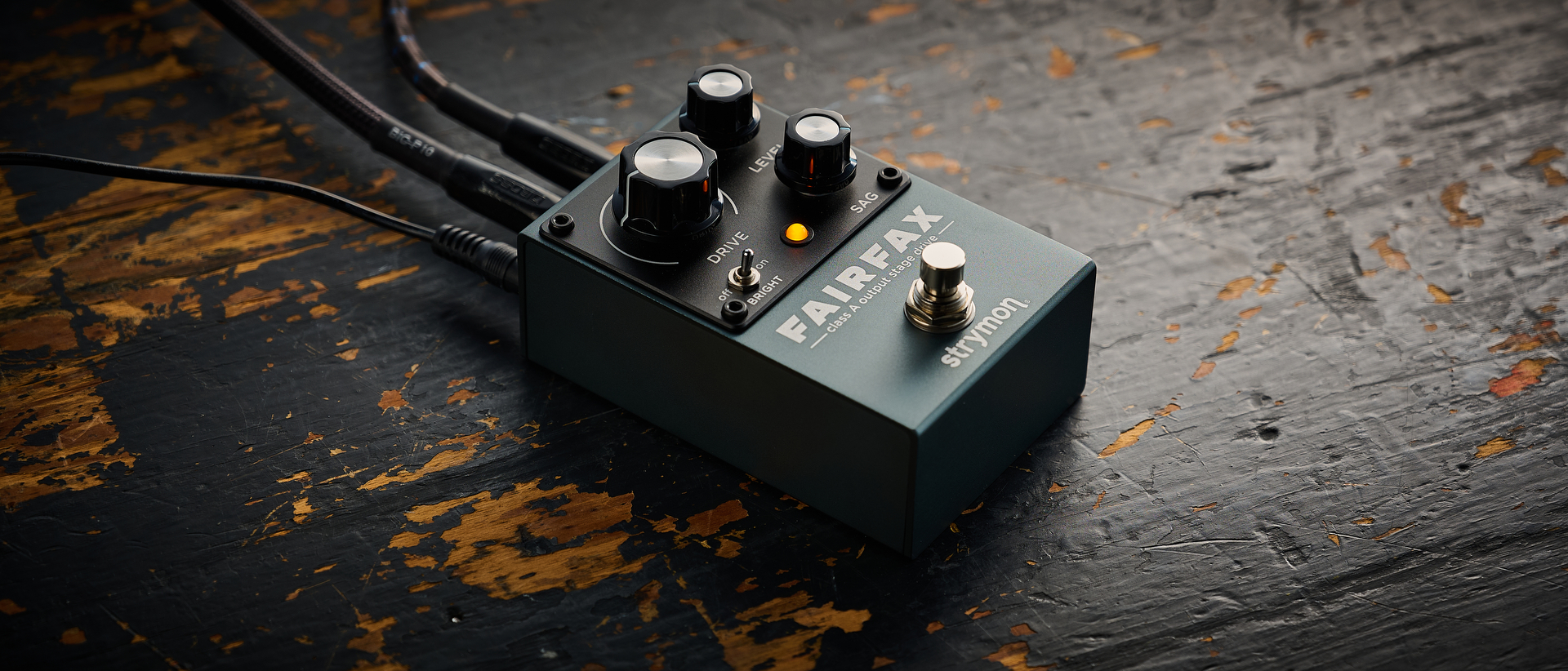Nick Johnston: "I wanted to evolve – and for me that meant learning how to sing, changing the guitars I use and experimenting with my tone"
The progressive virtuoso details new project Archival, his fresh Tele-style signature Schecter and why he's an "old man" when it comes to gear

All the latest guitar news, interviews, lessons, reviews, deals and more, direct to your inbox!
You are now subscribed
Your newsletter sign-up was successful
The last year has been one of rapid change for Canadian virtuoso Nick Johnston. First, he announced his partnership with Orange amps, joining the British manufacturers as a brand ambassador and trusting in the Rockerverb MKIII to handle his wonderfully expressive tones.
Then, just a few weeks ago, he started to tease his newest signature model with Schecter – the big surprise being the switch from Strat-style to Telecaster bodies. And now he’s just announced his latest project Archival – a radical departure from the instrumental fusion rock he’s known for, moving into singer-songwriter territory.
The debut album, titled Fear And Fate, lands at the end of this month, and its first single Words I Couldn’t Say sits much closer to the moody alternative rock of bands like Porcupine Tree than any of the guitar-led recordings in his discography thus far. Naturally, we had to find out more...
“2021 is my 10-year anniversary of releasing records and that made me want to change everything,” Johnston tells Guitar World, with an array of Schecter signatures and flowery shirts dotted around the room behind him. “I wanted to evolve – and for me that meant learning how to sing, changing the guitars I use and experimenting with my tone...
“I wanted it be completely fresh and all-new, doing things I haven’t done in the past, like using more pedals and effects,” he continues, with a sigh of relief. “And I’ve really enjoyed doing it. The music will come out on my own label. I’m not releasing it for anybody else, though I’m grateful to those who want to come on that ride with me. I just want to keep moving. If people say I don’t sound like I used to… that’s good. Who would want to stay stagnant?!”
Your previous signature models really helped change perceptions about Schecter being a metal-style guitar brand...
“Schecter are an amazing company, just look at their history. Tom Anderson came from there, so did John Suhr. And so did James Tyler, with those weird headstocks, which are a bit like an art installation. I don’t know how Schecter got the Diamond series models to play and sound so good for such a low price, it’s insane! The USA ones are even more crazy… those things are fuckin’ insanity.
All the latest guitar news, interviews, lessons, reviews, deals and more, direct to your inbox!
I wanted it be completely fresh and all-new, doing things I haven’t done in the past, like using more pedals and effects
“Not many people think of Schecter when it comes to these kinds of guitars. If someone told you that they were putting out a Strat and it’s going to do really well, you’d be like, ‘No it’s not... they have guitars called the Damien and the Omen!’ But it worked.
"Hopefully younger people playing a seven-string might see my new Tele and say, ‘Man, I wonder what that would do to my playing?!’ We’re gonna have the production run starting soon.”
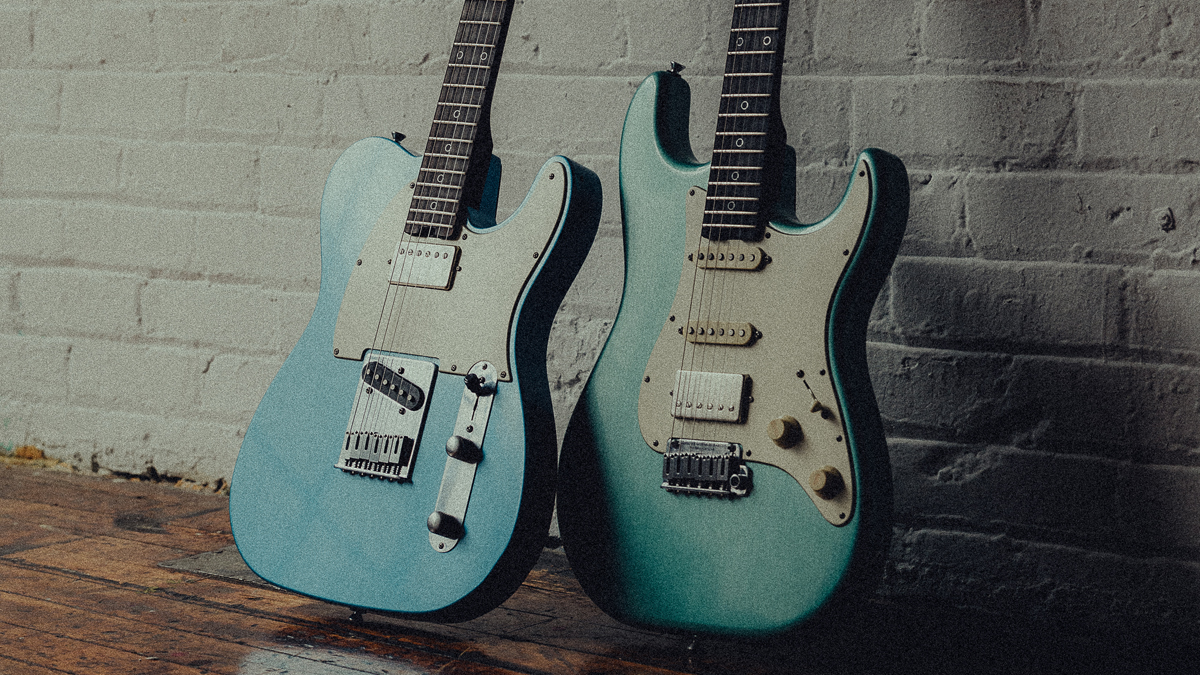
What exactly can we expect from the new signatures in terms of tonewoods and pickups – we noticed there’s a humbucker in the neck…
“That neck humbucker is a feature I’ve never had before. The fact it might not be an easy overnight transition, it might even take years to get used to, is what attracted me. It definitely makes my playing different because on the Strat I had mastered the pickup selector move – you hit that note, bend it and then flick on to the bridge.
"This guitar changes that. And I don’t have the floating bridge, which I would ‘play’ with my hand… well, not any more! I don’t even miss it because I’m playing differently. As long as I have my vibrato, I’m good...
The fact it might not be an easy overnight transition, it might take years to get used to, is what attracted me
“That neck pickup is something I co-designed with Schecter and sounds similar to the humbucker that’s in the bridge of the HSS version of my Strat, which is a bit lower in output for a humbucker.
"It’s an Alnico III, for those who care about magnet types, and uses this legendary insulated wiring that was originally a Fender product. They had a bit left over and Schecter bought the remaining stock. There are deep-dive forums where people fetishize over that shit.”
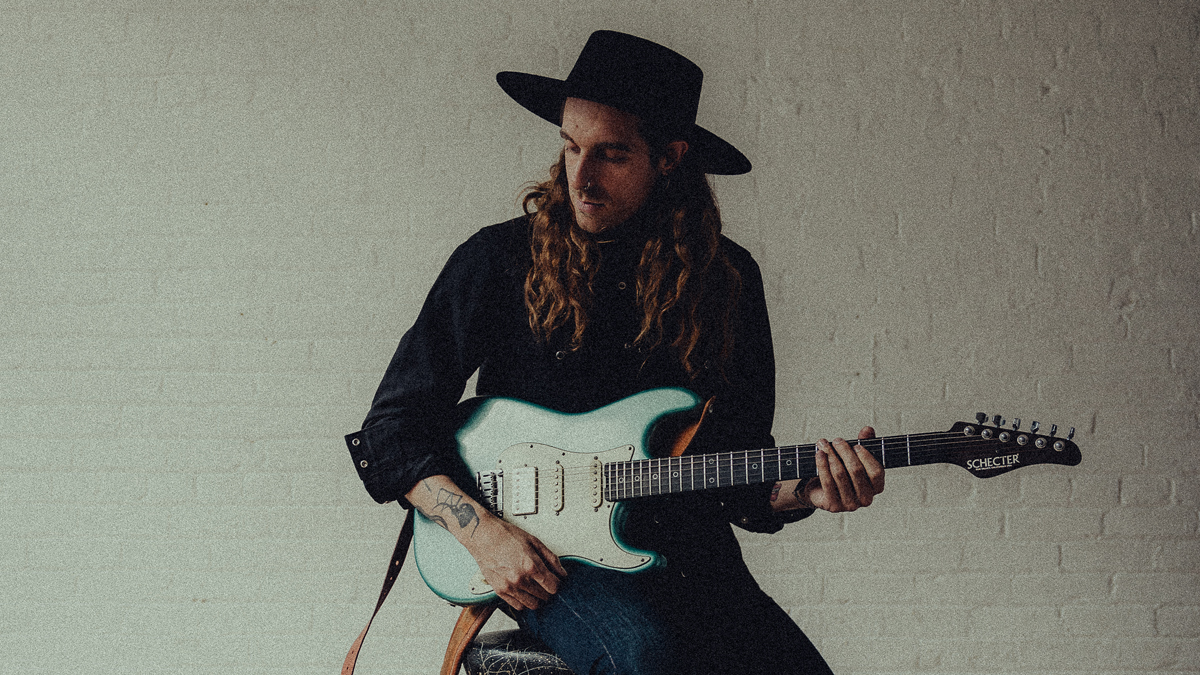
Well, a low output humbucker can get pretty close to single coil sounds, which is what you’re perhaps best known for...
“Exactly! I used humbuckers when I was younger and there were things I liked but also things I hated, like the sheer power of them and every single little movement having so much spotlight on it. Especially the shredder active pickups out there.
"I wanted to dial it back and make it more single coil-ish, plus you can split with the push-pull pot. I love that crispy, chocolate wafer kinda single-coil sound, they’re like a magnifying glass. They show all the good qualities in your playing – your percussiveness, rakes and control.
I love that crispy, chocolate wafer kinda single-coil sound... they show all the good qualities in your playing
“The guitars will have an alder body, wenge neck and ebony fingerboard, which is the combination we’ve been using since year two of my guitar, plus the biggest frets I can get and brass inlay. It’s really simple, but with some modern appointments here and there like a 14-inch radius neck.
"The American version will have a raw neck – you can feel the little wood grain pockets in it, because it’s just one piece of wenge. I think they told me one out of every six wenge necks will shatter during production, because the wood is so fine. The ones that get through are the perfect pieces… only the strong survive with wenge!”
So it’s a very classic kind of guitar with a few modern appointments...
“Yeah, I believe in tonewoods to an extent, but my ears aren’t really tuned to it. I don’t hear the big differences. I’m more concerned with stability. I live in Canada, where it’s too hot or too cold and guitars are terrified of that. These guitars don’t move, the frets don’t poke and they stay in tune. They work beautifully.
“We will have all the different finishes like Atomic Sapphire, Atomic Frost, Atomic Snow, Atomic Green, Atomic Coral… can you imagine how cool it will look in pink?!"
A Strat-style guitar is like a Swiss army knife, you can do so much with it. But in order to grow and change, I needed to try something different.
“We’ve been talking about this for years. My first real guitar that I fell in love with was a Fender American Deluxe Telecaster, with the binding and abalone inlays. I had that guitar back in 2008, but had to sell it to pay for the drums to record my first album. It’s like the one that got away!”
It goes back to trying out things that have nothing to do with what people assume my sound is. I essentially wanted something totally different
And how about the move to Orange… what prompted that?
“It kinda goes back to trying out things that have nothing to do with what people assume my sound is. I went to Orange because I essentially wanted something totally different.
"I’ve always liked that Plexi kind of sound – in the past I’ve used an old Marshall or a Friedman, or even the Mesa/Boogie TC-100. All of those amps have a modern take on that Plexi sound, with the treble scooped almost as if there’s a blanket over the speaker, they sound sticky and squishy.
“But the difference with Orange is they have their own kind of gain. And they are very revealing amps. If you suck through an Orange, it’s like, ‘Yo… this guy really sucks!’ I liked that transparency. They also take pedals and stack gain stages really well, with minimal efforts. I use the Rockerverb MKIII on the dirty channel and if you put any boost on that, you get this liquid-y sound that’s just insane.”
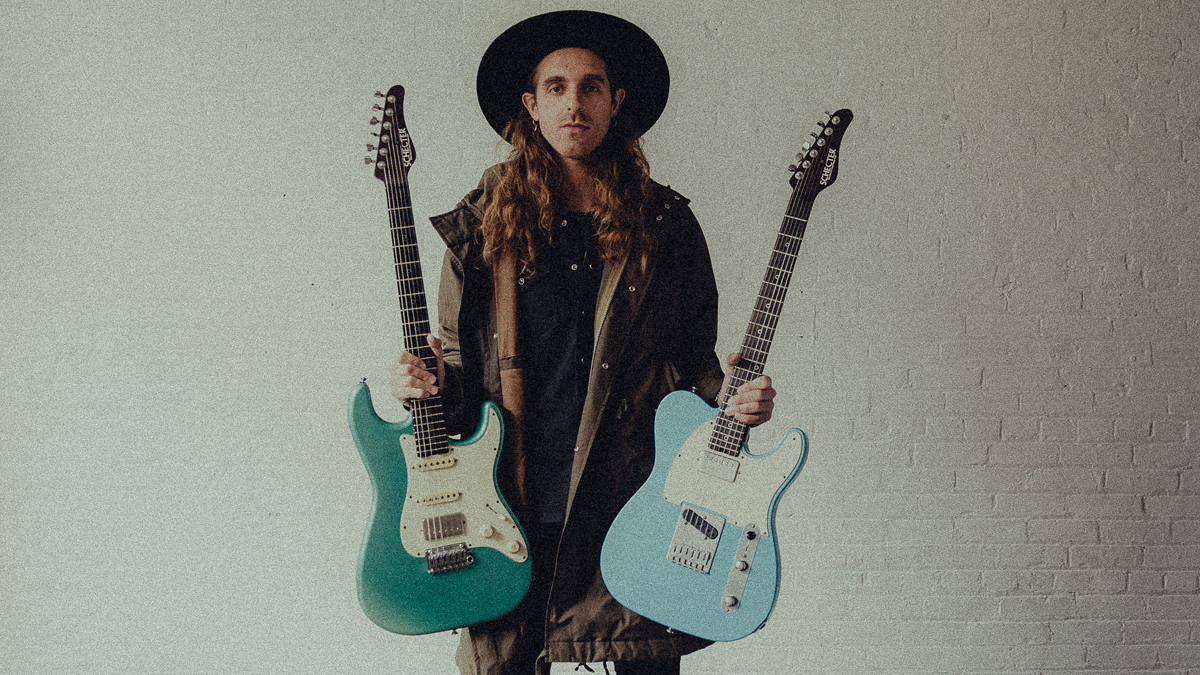
Then, of course, there’s the vintage throwback aesthetics...
“Yeah! I love the looks and vibe of Orange amps. They make workhorse amps with not too many features, which suits me because I’m kind of an old man when it comes to gear. I don’t like digital stuff. I’ve had people asking if I’d ever switch over to Neural DSP and it’s like… nah.
I never play an amp with the intention of playing the exact same way as I did on something else. I like to play to the amp's strengths rather than my own
“I just went with an amp company who are very cool and seem to be really interested in what I’m doing. When I play through an Orange, it makes me play a certain way.
"I never play an amp with the intention of playing the exact same way as I did on something else. I do that with guitars but not amps – I like to play to the amp’s strengths rather than my own...
“And amps can be really stubborn. You have to work with them and get an agreement going. There are certain things you can’t do but others that you can… and there’s enough of the good things with Orange that made me switch over. Their amps are loud and their cabinets weigh more than me (laughs).”
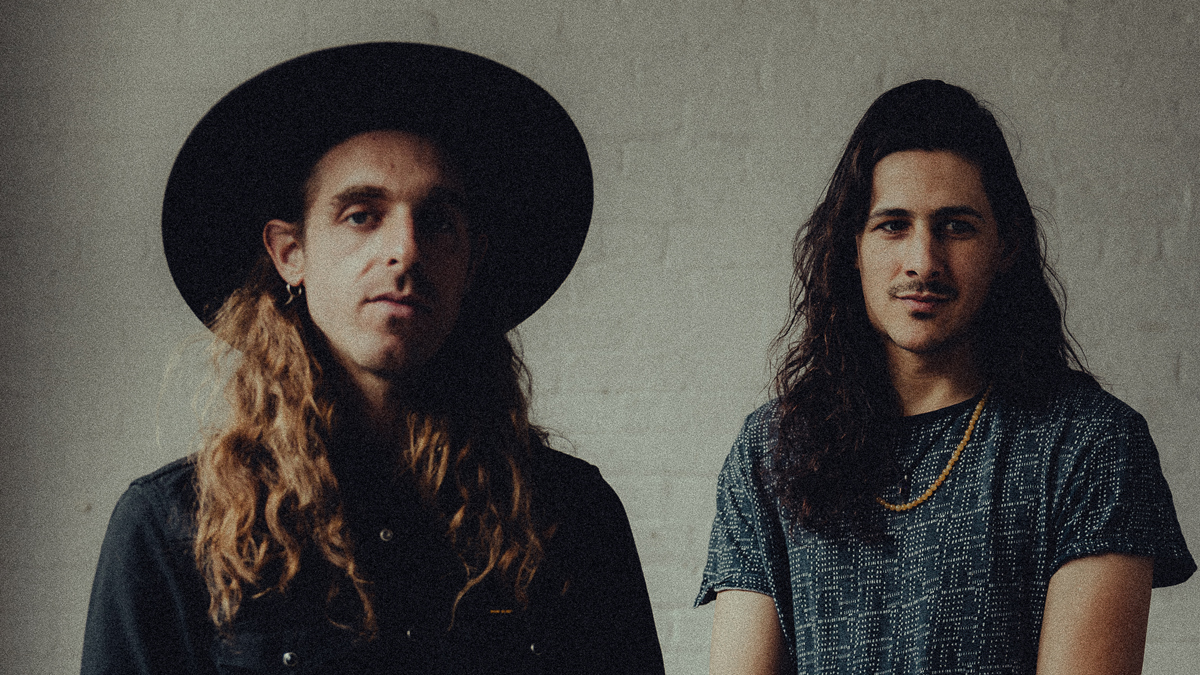
The new band will come as a bit of a surprise to some people. What’s the story behind it?
“I moved back home a year and a half ago after a breakup. I grew up beside this guy [Ben Ragan] who was basically my neighbor and roughly the same age. We talked but never really hung out. Some shit happened with him, so he moved home too. I knew he was into music, but he wasn’t a full-time musician and more of a hobbyist that dabbled.
“We bumped into each other one night and he told me to come over for a drink and check out this single he was working on. This was right before the pandemic came in and fucked everything up. I listened to what he was doing and sat at a piano and finished the song with him. We listened back and it sounded pretty cool. I felt really good about what just happened.
"I’d come out of this breakup and had come off this tour that was very mentally hard on me. I had a bad time on the road and felt really disgusted with instrumental music like, ‘Yuck, get me away from it!’”
That’s perfectly normal – we all get sick of doing the same things after a while...
“After 20 years of playing, despite the success, you can become very dark and jaded about music. And I felt great after working on this thing. I’d never worked with anybody before, other than guest solos, which is different.
"So I brought my acoustic over and started playing some chords, a song I had lying around from years ago called Fear And Fate. He started singing this verse melody and then when it came to the chorus, he told me to go for it. And I said, ‘No, no, no… I just play guitar, right?!’
That first record was the most seamless and organic thing. That was my first time writing music for vocals and I want to keep improving
“But he made me do it and immediately all the blood rushed to my face and I felt nervous. After being around music for so long it was pretty easy to pick out the harmony parts and I swear to god… all the endorphins rushed to my brain.
"It was so overwhelming. I hadn’t felt like that in so long, this level of magic and connection that I hadn’t felt since I was 16 and starting out in bands. We still practice twice a week. It’s become like a therapy thing!
“We wrote 20 songs like nothing, that first record was the most seamless and organic thing. The guitar playing didn’t really matter, though there are some interesting parts harmonically. The main thing was recreating that basement magic of two guys in a room together. It was my first time writing music for vocals and I want to keep improving and learning.”
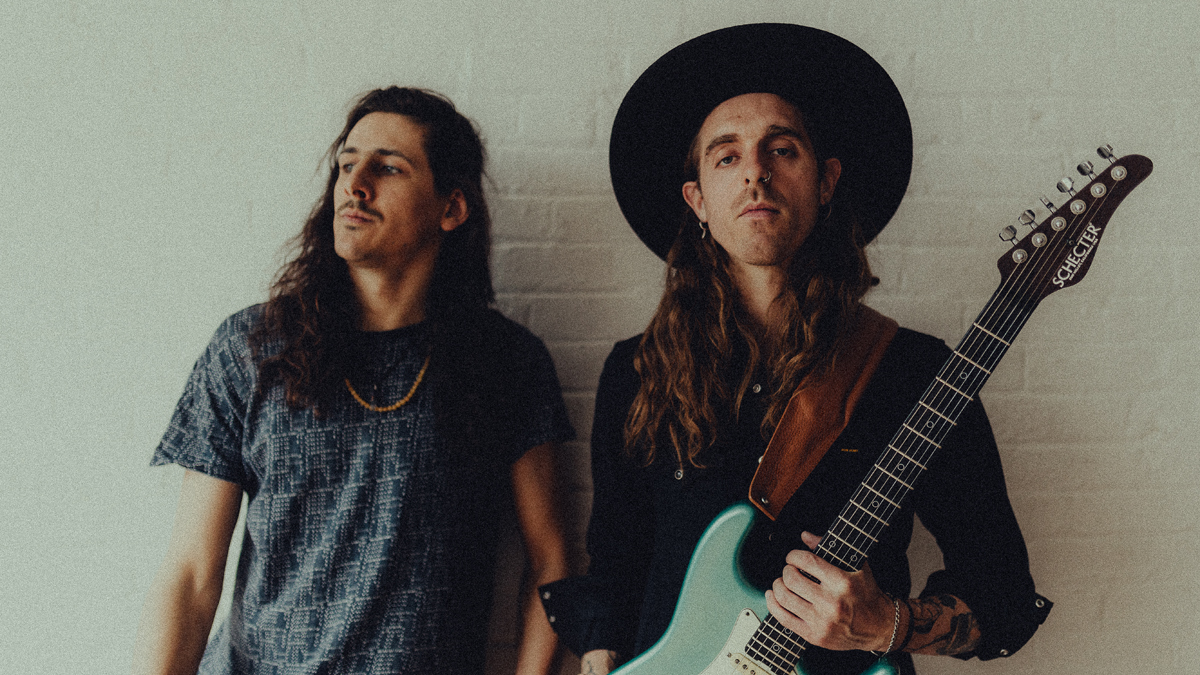
You mentioned you were starting to experiment with more pedals. We’d love to know what’s on the ‘board right now...
“I actually don’t have a pedalboard! At the moment it’s still only a small collection of pedals… and I don’t even know where they are. I don’t really write with effects, that’s not how my mind works, but when I go into the studio with my next solo album me and my engineer will build a board. I want a lot of '70s kind of shit. Even on the new Archival record, I started dipping into sounds from that era.
I just want to sound different. That's my main focus right now
“I think the Juno keyboard came out in the late-'70s or early-'80s, and I think TC Electronic put out this chorus pedal called the June [60]. It’s kind of a nasty-sounding chorus! I’ll definitely be using some phaser, roto, wah, flanger and vibe.
"I definitely want more colors in the tones with lots of really analog-sounding modulation, nothing too watery or precise. I just want to sound different. That’s my main focus right now.”
Amit has been writing for titles like Total Guitar, MusicRadar and Guitar World for over a decade and counts Richie Kotzen, Guthrie Govan and Jeff Beck among his primary influences as a guitar player. He's worked for magazines like Kerrang!, Metal Hammer, Classic Rock, Prog, Record Collector, Planet Rock, Rhythm and Bass Player, as well as newspapers like Metro and The Independent, interviewing everyone from Ozzy Osbourne and Lemmy to Slash and Jimmy Page, and once even traded solos with a member of Slayer on a track released internationally. As a session guitarist, he's played alongside members of Judas Priest and Uriah Heep in London ensemble Metalworks, as well as handled lead guitars for legends like Glen Matlock (Sex Pistols, The Faces) and Stu Hamm (Steve Vai, Joe Satriani, G3).

